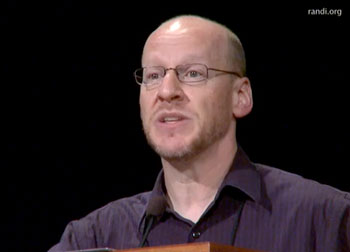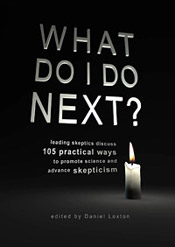by
Daniel Loxton, Jun 21 2011

“The Amazing Meeting 9″ conference — organized skepticism's biggest, broadest, and most important meeting of the minds — is almost upon us. It seems a good moment to look back at the most widely discussed presentation at last year's TAM: astronomer Phil Plait's “Don't be a Dick” speech (video) calling for less name-calling1 and more civility in skeptical outreach:
The best idea ever thought of in the history of humanity is useless unless someone communicates it. It will die in the test tube. And in our case, what we’re communicating here to people is not necessarily something they want to hear. And so, our demeanor — how we deliver this message — takes on crucial, crucial importance.
As some readers may know, Plait's “DBAD” speech touched off an online firestorm that smolders to this day.
I explore the ethics of skepticism quite often2 (it's one of the main reasons I blog in addition to writing books and Skeptic magazine articles) but today I'd like to look at something simpler and more concrete. Let's explore a straightforward historical question:
Was Plait's call for civility something new for skepticism?
It happens that the answer is, “No, not even a little bit.” (Please note: this is a long article, running over 4500 words.)
Continue reading…
comments (105)
by
Daniel Loxton, May 24 2011
As most of you will have heard, Christian radio mogul Harold Camping's predicted “Rapture” came and went on May 21st without so much as a trumpet sounding. This failure of prophecy unfolded to a clamour of Tweets and parties from the nonbelievers' side of the aisle. There's something undeniably funny about a confident prediction unfulfilled, and Camping's prediction couldn't have been much more confident: “We know without any shadow of a doubt it is going to happen.”
Still, personally, I had a hard time enjoying the circus. It seemed ghoulish to crack wise when so many hopes and dreams — and lives — hung in the balance. Belief, as we skeptics know all too well, cuts across lines. Beliefs unite the clever and the dull, the young and the old, the righteous and the wicked. Camping's fear-mongering meant good people sold homes, quit jobs, broke up families, or spent the college money on apocalyptic billboards. I worried especially about the kids lying awake that week waiting for the end of the world, just as I worry about the kids suffering artificial, unnecessary terror over 2012.
Continue reading…
comments (58)
by
Daniel Loxton, Jan 18 2011
The other day I was talking with Desiree Schell about activist stunts. What makes one stunt an effective protest action, and another a placebo protest (in Tribal Science author Mike McRae's memorably pointed phrase)?

This 68-page PDF brings together 13 leading skeptics for a panel-format discussion of skeptical activism
As skeptics consider skeptical activism (perhaps using some of the ideas described in this 68-page PDF panel discussion, or this point form version), what steps can we take to maximize the impact of our hard work? How can we make the best use of our limited resources? And, how can we avoid the trap McRae describes: “outreach efforts that have no real prior goal other than a vague sense of improvement in the public’s awareness of how silly something sounds and how sensible science must be.” (I give more weight to awareness campaigns than does McRae, but his point about goals is well taken.)
Desiree Schell is the person to ask. She's well known as the host of Skeptically Speaking (a live radio talk show carried on dozens of stations, also released as a podcast), but it's her day job that makes her a relevant expert: Desiree is a professional union organizer. Not only has she organized dozens of marches, rallies, protests, and other direct actions, but she literally teaches courses instructing other labour organizers about effective direct action strategies.
Continue reading…
comments (31)
by
Daniel Loxton, Sep 19 2010

[Continued from Part I]
Speaking personally, I must say it's a joy to watch the growth of the skeptical subculture, humming with its proliferation of cons and pub nights and vibrant online portals. And yet, much of that scene is related only indirectly to the cause I work to advance. At some risk of being misunderstood: it's not my goal to grow a social community, even though I am part of it.
My area of primary interest is more specific. As a (relatively junior) contributor to the specialized field of skepticism, I care most about active efforts to investigate fringe science topics, share the findings, and promote science literacy as widely as possible. After decades of work, this research and educational outreach effort eventually became the seed for a thriving subculture, but it is not synonymous with that subculture.
This is a distinction that could save a lot of flame wars:
Continue reading…
comments (26)
by
Daniel Loxton, Sep 10 2010
My recent post “The War Over 'Nice'” (describing the blogosphere's reaction to Phil Plait's “Don't Be a Dick” speech) has topped out at more than 200 comments. That's a lot by Skepticblog's standards. In addition, many further responses have reached me through Twitter, blog posts, email, and direct conversation.
I'm not quite sure how to feel about all that. Certainly I expected some controversy. (After all, I was writing about a controversy.) But quite a few of the critical responses take up a theme that seems… well, kind of strange to me. Many readers appear to object (some strenuously) to the very ideas of discussing best practices, seeking evidence of efficacy for skeptical outreach, matching strategies to goals, or encouraging some methods over others. Some seem to express anger that a discussion of best practices would be attempted at all. Continue reading…
comments (196)
by
Daniel Loxton, Aug 27 2010
 Skeptics and parallel rationalist communities spend a lot of time on “inside baseball” — jargon-filled debates about technical matters that seem incomprehensible, dull, or ridiculous to outsiders. These shouldn’t be the main skeptical topics (shouldn’t we be busy solving mysteries and educating the public?) but some discussion on these matters is unavoidable and worthwhile. Many movement-oriented skeptics and organizations have things they hope to accomplish; with goals, there comes discussion of best practices.
Skeptics and parallel rationalist communities spend a lot of time on “inside baseball” — jargon-filled debates about technical matters that seem incomprehensible, dull, or ridiculous to outsiders. These shouldn’t be the main skeptical topics (shouldn’t we be busy solving mysteries and educating the public?) but some discussion on these matters is unavoidable and worthwhile. Many movement-oriented skeptics and organizations have things they hope to accomplish; with goals, there comes discussion of best practices.
Among these insider debates, none is more persistent than that of “tone.” Hardly a week goes by that some tone-related tempest doesn’t spill out of its teacup and across the blogosphere. And yet, these issues matter to many (including me). When people devote enormous energy to skepticism, dedicate careers to skeptical outreach, or generously commit volunteer hours or donations to skeptical projects and organizations, it’s natural that abstract internal debates about the soul of skepticism are perceived to have powerful importance.
Continue reading…
comments (243)
by
Daniel Loxton, Jul 02 2010

Images from "Mecanisme de la Physionomie Humaine," which Charles Darwin used as a source for his research into human expression and emotion
Alongside the moral and ethical arguments about “tone,” skeptical debate about the effectiveness of various communication strategies goes ’round and ’round perpetually.
But why is the effectiveness question so often treated as a debate between competing intuitions? In a recent comment, Steven Novella suggested to me that skeptics should “be tolerant of each other’s different approaches to the public, since no one has the final answer. As the psychological literature progresses, however, we may have better informed opinions.”
But is the psychological jury still out? Science has been looking at people, our interactions, and the ways in which we learn and communicate for quite a while. (Did you know there’s a substantial body of scientific research on just the topic of smiling?)
Therefore, as a skeptic, I want to know: what has science learned about communication? Continue reading…
comments (45)
by
Michael Shermer, May 18 2010
Liberty and The Man Who Shot Liberty Valance.
This is the third essay in a series on the relationship between rules, freedom, and prosperity.
Read part 1 on Skepticblog.org and part 2 over at True/Slant.

I believe that the following commentary on the necessity of law and order has some bearing on what is unfolding in Arizona—when the rules are not clearly written or consistently enforced, people will take the law into their own hands because society cannot run smoothly without law and order.
In Part 3 in my essay series on the relationship between rules, freedom, and prosperity, I want to turn to one of my favorite films, John Ford’s 1962 classic, The Man Who Shot Liberty Valance, in which a clash of moralities unfolds in the wild-west frontier town of Shinbone, Arizona. There in the dusty streets and ramshackle buildings two self-contained and self-consistent moral codes come into conflict. One moral code is the Cowboy Ethic, where trust is established through courage, loyalty, and personal allegiance to friends and family, and where disputes are settled and justice is served between individuals who have taken the law into their own hands. The other moral code is the Law Ethic, where trust is established through the transparent and mutually-agreed upon rule of law, and where disputes are settled and justice is served between all members of the society who, by virtue of living there, have tacitly agreed to obey the rules. Only one of these moral codes can prevail. Continue reading…
comments (60)
by
Michael Shermer, Jan 12 2010
Nothing fuels religious extremism more than the belief that one has found the absolute moral truth. Islamic terrorism, for example, has gradually shifted from secular motives in the 1960s to religious motives today. A 2000 study by the state department that resulted in the publication Patterns of Global Terrorism, found that in 1980 there were only two out of sixty-four militant Islamic groups whose mission was religiously based. In 1995 that figure had climbed to nearly half. The figure is undoubtedly higher today. (http://fpc.state.gov/documents/organization/54249.pdf)
It is a type of fuel that can lead to what Clay Farris Naff, Executive Director of the Center for the Advancement of Rational Solutions in Lincoln, Nebraska, cleverly calls the “neuron bomb,” after its cold-war counterpart, the “neutron bomb,” designed to kill people while leaving buildings and infrastructure in tack. A schematic of the neuron bomb looks like this: Continue reading…
comments (52)




 Skeptics and parallel rationalist communities spend a lot of time on “inside baseball” — jargon-filled debates about technical matters that seem incomprehensible, dull, or ridiculous to outsiders. These shouldn’t be the main skeptical topics (shouldn’t we be busy solving mysteries and educating the public?) but some discussion on these matters is unavoidable and worthwhile. Many movement-oriented skeptics and organizations have things they hope to accomplish; with goals, there comes discussion of best practices.
Skeptics and parallel rationalist communities spend a lot of time on “inside baseball” — jargon-filled debates about technical matters that seem incomprehensible, dull, or ridiculous to outsiders. These shouldn’t be the main skeptical topics (shouldn’t we be busy solving mysteries and educating the public?) but some discussion on these matters is unavoidable and worthwhile. Many movement-oriented skeptics and organizations have things they hope to accomplish; with goals, there comes discussion of best practices.
